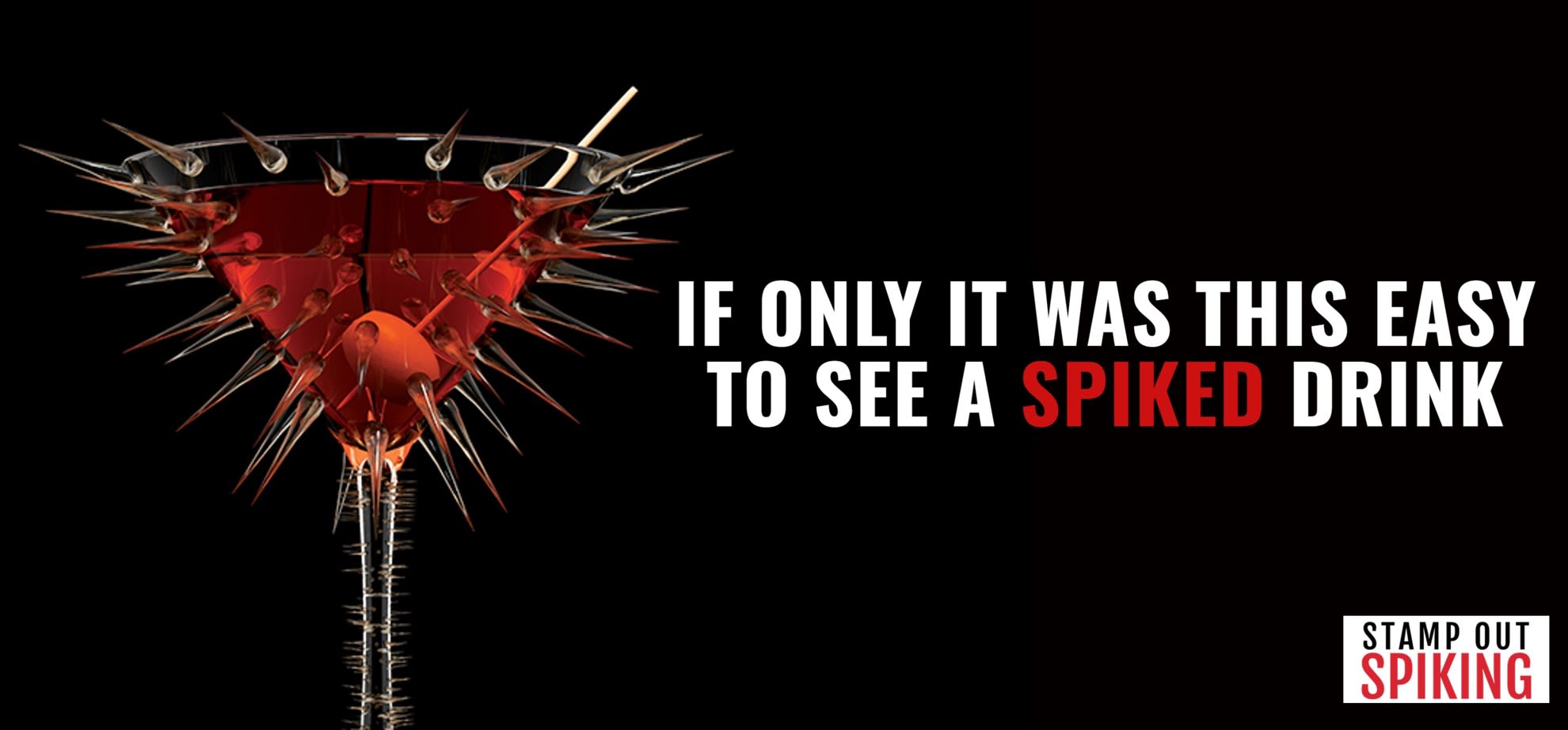Spiking isn’t a new story, but it demands a new solution
Stamp Out Spiking: A new approach to spiking prevention

Never leave your drink unattended.
Stay close to friends on a night out.
Do not accept drinks from strangers.
Keep your glass covered at all times.
Watch your drink being made.
When it comes to reducing the risk of spiking, these are some of the most widely shared tips to keep yourself safe.
And for good reason, given that covertly slipping something into a person’s drink is the most common form of spiking in the UK, police data shows.
Spiking is defined as the administration of substances like drugs or alcohol to another person without them knowing or consenting.


Jess' Story
In July 2024, Jess Thurgur, 31, was enjoying the final day of her family holiday before heading home to West London when she stopped for a cocktail.
This was her first alcoholic drink of the evening, but after only a few sips she suddenly felt weak and unable to stand.
She said: “At the time I thought maybe it was heatstroke, so I carried on drinking, but I got worse and worse."
Jess quickly realised the cocktail had been spiked when she recognised the jelly-like sensation in her legs was identical to the feeling she had during a previous spiking incident years before.
She believes the spiked drink wasn't intended for her, and instead, it was made for a group of young women sat nearby.
“I was in such a vulnerable state, I couldn’t even walk so my fiancée was having to hold me up, and at this point, I’d only drunk half the cocktail – if that."
“You know your body and you know when something’s wrong, you just have to follow your gut feeling".
Jess Thurgur

Spiking substances
In many cases, ‘date-rape’ drugs are used to spike drinks.
The most common example of a date-rape drug is Rohypnol (flunitrazepam), a central nervous system depressant created in the 1970s to treat insomnia and induce anaesthesia before surgical procedures.
Rohypnol can cause memory loss, unconsciousness, muscle relaxation and sedation strong enough to fully incapacitate someone, according to Professor Amira Guirguis, Chair of the Royal Pharmaceutical Society (RPS) Science and Research Committee.
“Rohypnol was initially manufactured as a white tablet that could be slipped into drinks without changing their colour, taste, or smell, making it very hard to notice”
Professor Amira Guirguis, Chair of RPS Science and Research Committee.
In 1997, the manufacturer modified Rohypnol following concerns it was a date-rape drug, misused to facilitate assault or other crimes such as theft.
To make it easier to spot a drink spiked with Rohypnol, it is now manufactured as a green, oval-shaped tablet with a blue speckled core that dyes light-coloured liquids blue when dissolved.
However, Professor Guirguis warned that some colourless versions of the drug still exist, making it nearly impossible to detect.
She added that other recreational drugs like Ecstasy, methamphetamine, LSD and Ketamine are also used to spike drinks.

How does being spiked affect your body?
Hear from Dr Nick Merrifield about how being spiked affects the human body, how spiking substances interact with alcohol, how to spot the symptoms of spiking, and what he hopes will change in the future.
What does the data show?
Data from the latest Met Police records outline that in 2024 there had already been 1,161 reports of spiking by the end of October.
This means across Greater London, the number of spiking incidents reported last year is 40 times greater than it was in 2015.
But as reports of drink spiking soar in London, a new campaign from anti-spiking charity ‘Stamp Out Spiking’ is hoping to tackle the problem at its source.
The latest campaign image from anti-spiking charity 'Stamp Out Spiking', available at stampoutspiking.org
The latest campaign image from anti-spiking charity 'Stamp Out Spiking', available at stampoutspiking.org
Dawn Dines, CEO and founder of Stamp Out Spiking, believes public awareness is the key to prevention.
She said: “Spiking can happen to anyone, at any time, at any place, so everyone needs to be aware.
“Protective drink covers are a good start, but that’s exactly what they are, a start.”
“We need cultural change, societal change”.
Spiking legislation
Spiking is considered a crime under various legislation including the Offence Against the Person Act 1861.
However, it is not currently classified as a standalone criminal offence in the UK.
Spiking is severely underreported, and police efforts to investigate and prevent cases are limited.

Reporting spiking incidents
Like many victims forced into a vulnerable state after being spiked, Jess believed she didn’t have enough evidence to make reporting it to the police worthwhile.
However, this still plays on her mind frequently.
“The main thing I felt was anger, and a level of guilt too because I didn’t report it.
Jess Thurgur
“I worry about all the other people that might experience the same thing I did.
“But equally, I think there’s a lot of victim blaming.

"People think they’re doing the right thing by telling me ‘you have to report it, if you don’t report it you’re putting others in danger’ but that’s so easy to say when you’re not in the situation yourself”
Jess Thurgur
In 2024, a drinkaware study found that 90% of spiking incidents are not reported to police, and around half of the victims said this was because they didn’t see a point.
Picture Credit: Original (Madelaine Dowds)
Picture Credit: Original (Madelaine Dowds)
The lasting impact of being spiked
Beyond her distressing experience that night, being a victim of spiking has highlighted wider concerns for Jess.
“It’s a hard realisation that you shouldn’t feel safe anywhere you go"
Jess Thurgur
She continued: “It’s sad to think that even if you go out in a big group of friends or you’re with your family, you can still easily become victim to these things.
“Sadly, I’ve realised there’s really nothing you can do to avoid being targeted”
Jess Thurgur
Jess hasn’t been to a club or bar since her drink was spiked in July, as she feels ‘apprehensive’ each time she’s invited on a night out.
“I don’t want to live my life in fear, or be controlled by it.
“It’s not fair that I have to make adjustments in my life to avoid being spiked.”
Jess Thurgur

Building on previous efforts to tackle spiking, the UK has seen significant advocacy and public campaigns aimed at raising awareness and establishing preventive measures.
This includes the 'Ask for Angela' initiative, which was designed to offer discreet assistance to individuals who feel unsafe or uncomfortable in social venues.
However, there are growing concerns about the initiative's effectiveness.
A recent BBC undercover investigation discovered that more than half of venue staff in London failed to properly respond to the 'Angela' codeword, which is meant to trigger immediate support for the person enquiring.
This highlights a gap in staff training and public awareness that is crucial for the safety of vulnerable people.
Stamp Out Spiking:
A new approach
'Stamp Out Spiking' distinguishes itself by focusing on the root causes of drink spiking, aiming to change societal behaviors and norms that allow it to persist.
Unlike initiatives that primarily concentrate on victim prevention, this charity seeks a more systemic change.
'Stamp Out Spiking' collaborates with policymakers to advocate for stricter regulations and penalties regarding spiking, as well as working with venues to implement safety measures.
By addressing the problem at its source, 'Stamp Out Spiking' aims to create a society where spiking is less likely to occur in the first place.

After campaigning to change the law since 2021, Stamp Out Spiking finally saw progress when the Prime Minister pledged to make spiking a ‘criminal offence’.
Spiking will be made a criminal offence.
— Keir Starmer (@Keir_Starmer) November 25, 2024
My government was elected to take back our streets, central to this mission is making sure women and girls can feel safe at night.
Perpetrators of spiking will feel the full force of the law.
A zero tolerance future
Dawn Dines said the PM’s statement pledging to was ‘brilliant’, but there is ‘still more work to be done’.
Her mission with Stamp Out Spiking is to receive government funding for mandatory training on issues like spiking.
She said: “I’m fighting to have long-term impact in the way spiking is perceived, there needs to be zero tolerance.
“We need to make sure that people really believe victims.
“People need to be aware of the severity so they will intervene and stop perpetrators.
“Then it needs to be implemented into all walks of society.”
To find out more and support the ‘Stamp Out Spiking’ campaign, visit www.stampoutspiking.org










